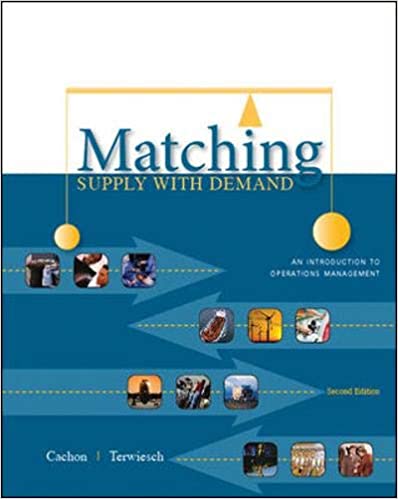
Matching Supply with Demand: An Introduction to Operations Management 2nd Edition by Cachon Terwiesch
Edition 2ISBN: 978-0697811059
Matching Supply with Demand: An Introduction to Operations Management 2nd Edition by Cachon Terwiesch
Edition 2ISBN: 978-0697811059 Exercise 2
(Airline) Consider the baggage check-in of a small airline. Check-in data indicate that from 9 a.m. to 10 a.m., 255 passengers checked in. Moreover, based on counting the number of passengers waiting in line, airport management found that the average number of passengers waiting for check-in was 35. How long did the average passenger have to wait in line?
Explanation
Little's Law states that the long-term average number of customers in any stable system is estimated by multiplying the long-term average effective arrival rate with the average time a customer spends in the system.In a baggage check-in counter passenger arrives at different time, give their baggage at the counter and leaves the counter with a ticket. Passengers need to wait in queue for their turn before they can be served.
This is the case of a small airline baggage check-in counter. 1-hour (9AM - 10AM) data shows that 255 passengers check-in. However, there were on an average 35 passengers waiting in queue during that time.
By using the concept of Little's Law, find the flow time as -
 Note that the customers will experience waiting (both n queue and during the service delivery) during the overall flow process and the total waiting time in the system is in fact the flow time.
Note that the customers will experience waiting (both n queue and during the service delivery) during the overall flow process and the total waiting time in the system is in fact the flow time.  Thus, passengers have to wait for an average for
Thus, passengers have to wait for an average for

This is the case of a small airline baggage check-in counter. 1-hour (9AM - 10AM) data shows that 255 passengers check-in. However, there were on an average 35 passengers waiting in queue during that time.
By using the concept of Little's Law, find the flow time as -
 Note that the customers will experience waiting (both n queue and during the service delivery) during the overall flow process and the total waiting time in the system is in fact the flow time.
Note that the customers will experience waiting (both n queue and during the service delivery) during the overall flow process and the total waiting time in the system is in fact the flow time.  Thus, passengers have to wait for an average for
Thus, passengers have to wait for an average for
Matching Supply with Demand: An Introduction to Operations Management 2nd Edition by Cachon Terwiesch
Why don’t you like this exercise?
Other Minimum 8 character and maximum 255 character
Character 255


